Republicans are now bursting with specific health reform proposals to replace Obamacare. Last week came the report of the House Task Force on Health Reform appointed months ago by Speaker Paul Ryan.
Now comes actual legislation introduced by House Rules Chairman Pete Sessions (R-TX) and by Senator Bill Cassidy (R-LA), which leading free market health economist John Goodman helped to develop. They immodestly call it, with good reason, The World’s Greatest Health Care Plan.
The bill is based on an advanceable, refundable, universal health insurance tax credit available to everyone to help buy the private health insurance each worker and family prefers in a competitive marketplace. The credit will vary by age and geography, but not income, averaging $2,500 per adult, and $1,500 per child.
The Sessions/Cassidy plan is based entirely on freedom of choice and competition, with no individual mandate and no employer mandate. For the first time, the federal government will provide the same tax relief for health insurance for everyone, regardless of whether it is obtained – at work, in the marketplace, or in an Exchange.
Thousands of federal regulations imposed by Obamacare would be abolished, with health insurance regulation returned to the states. Federal laws that prevent employers from providing their employees with portable insurance that travels with the employee from job to job and in and out of the labor market would also be repealed.
Sessions/Cassidy would block grant Medicaid to the states in four separate grants for each of the four Medicaid populations – individuals, parents with children, the disabled, and those needing long term care. Instead of the federal assistance to each state varying with the amount each state spends, the federal funding ultimately would be based on an equal per capita grant for each of the four populations.
States would each have the flexibility to provide their Medicaid assistance in the form of premium support that the poor could use in addition to their universal health insurance tax credit to help buy the health insurance each worker and family preferred. States could choose to use some of their Medicaid block grant funds to finance state risk pools for the uninsured who become sick with highly expensive diseases, like cancer or heart disease.
The poor could choose to opt out of Medicaid and claim the tax credit to help purchase private health insurance instead. For anyone who does not use the tax credit at all, and is not covered by employer health insurance, Medicaid or Medicare, the credit amount would be sent to safety net institutions where those uninsured live.
Sessions/Cassidy also provides for Roth style Health Savings Accounts (HSAs), with no deduction for contributions, but no tax on withdrawals. The tax credit can also be used to make contributions to HSAs, with further contributions made with after tax dollars.
Goodman also seeks to use this legislation to pioneer the development of health status insurance. Those with such insurance would be protected against the cost of deterioration of their health any time while covered.
If an individual contracted cancer, for example, while covered by such insurance, the patient may transfer to another health insurance plan he or she believes would be better for their condition. The original health plan would then be liable to the new plan for a risk adjustment payment they both negotiate to compensate the new insurer for the costs of the patient.
The market, rather than regulating government bureaucrats, would then be developing the amount of such risk adjustment. This would also create a market for some health plans to develop an expertise for treating the sick, for which they would be compensated. Consequently, instead of health insurers competing to avoid covering the sick, there would be a new competition among health insurers attract the sick cover and meet their needs.
Self-insured employer plans and labor union plans may elect to be grandfathered under their current governing system. The same would be true for individuals with insurance obtained from Obamacare.
The American people are likely to vastly prefer this freedom of choice, patient power, competition over Obamacare.
Peter Ferrara served in the White House Office of Policy Development under President Reagan, and as Associate Deputy Attorney General of the United States under President George H.W. Bush. He currently serves as Senior Fellow for Budget Policy and Entitlement Reform for the Heartland Institute, and as Senior Policy Advisor for the National Tax Limitation Foundation.


